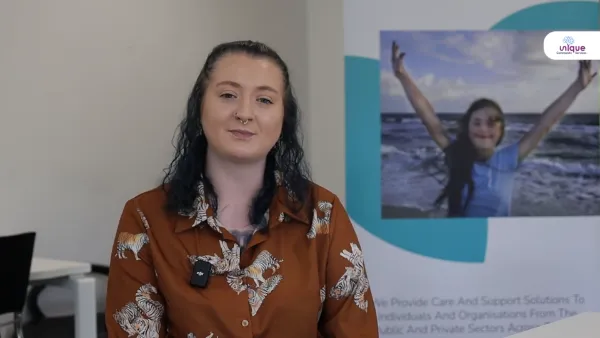This is the story of Jane, a young woman who spent more than nine months in an institutional setting. Through the perspective of our Assistant Registered Manager, Aimee Rossbottom, we explore how positive risk-taking and holistic, person-centred support helped Jane improve her well-being and regain her independence.
Getting to Know Jane
When we first met Jane, she had been in the hospital for over nine months and was supported by a large team. Our priority was establishing a strong bond with Jane while creating a personalised care plan to ensure a smooth transition from the hospital back to her home. The goal was to support Jane in building confidence and fostering well-being, helping her lead a more independent life and pursue her educational dreams.
Initially, Jane felt hesitant about spending time with our support team and was very wary of the care system. As Assistant Registered Manager, Aimee recognised that Jane needed compassionate support and understanding, so she provided hands-on care, taking the time to truly understand Jane’s feelings. As a team, we established a strong bond with Jane, focusing on breaking down the barriers of communication and building trust. Throughout this process, we learnt about Jane’s preferences, including what she enjoyed and valued. These insights were crucial in tailoring her care plan to meet her specific needs and desires.
The Journey
The journey began by collaborating with our multidisciplinary team and actively including Jane in her care plan while she was in the hospital. Jane’s well-being improved, and her behaviours of concern significantly decreased. When she felt ready and prepared, we started the discharge process, ensuring her transition home was smooth.
We started supporting Jane within her family home and focused on creating a supportive and nurturing environment where she could thrive. We worked together with Jane and her family to assess what adaptions and assistive technology would best support her independence. Jane and her family were directly involved in the care planning, and we always consulted Jane about what she felt most comfortable with, from daily routines to the support team, which empowered Jane to feel in control and confident in her independence.
The Impact of Positive Risk-Taking
Over time, Jane discovered activities that she enjoyed while spending time with our support workers. She was actively encouraged to choose her own activities, fostering a sense of ownership and creativity. Jane also participated in weekly care plan reviews while communicating with social workers and the commissioning team, who were excited for Jane to be involved in building her support plan. She was very open to positive risk-taking, so we encouraged Jane to think outside the box and explore new ideas about how she could take more control over her care.
As Jane embraced positive risk-taking, she began to take control of her mental health. She reflected on past challenges and worked alongside her support team so that together, they could develop strategies to overcome them. The process of overcoming her challenges empowered Jane, and she started to feel more confident and resilient. One of the most significant milestones in her journey was when she began taking regular walks in the local park with the support team remaining 20 feet away, offering her space to explore her independence.
The Positive Outcome
Through holistic support, positive reinforcement and close collaboration, Jane has gained the confidence to return to education and pursue her dreams. Setting herself a goal of completing four GCSEs in five months, Jane successfully reached her target, demonstrating her incredible determination and resilience.
In addition to her educational achievements, Jane sought out more meaningful activities, and started volunteering alongside her studies. Her dedication and confidence are a testament to her strength and the impact of person-centred support.
By embracing new opportunities, Jane has cultivated a positive mindset and built new relationships within her community. Her behaviours of concern significantly decreased, and Jane is happier and more excited about her future.
As a team, Unique Community Services is honoured to be a part of Jane’s transformative journey. To learn more about Jane and the power of humanised care, watch the video below.
